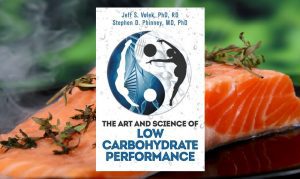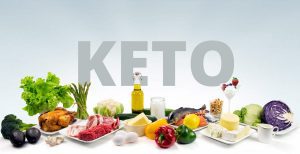For those of you who have heard of the Ketogenic Diet, this is a great book.
The diet involves reducing your carbohydrate intake to the point where your body becomes “fat adapted” and burns more fat as fuel. This is a nutritional strategy employed by a lot of triathletes and ultra-marathon runners, as you can fuel your body in a more sustained way.
It’s also an option for dieters (if they can handle it!)
My fifth recommended read is…
The Art and Science of Low Carbohydrate Performance by Jeff Volek
PRO TIP: Take notes! When you read a book, use a blank sheet of paper as a bookmark. Write down any interesting facts and information from the book. This condenses a whole book into 3-4 pages of key notes that are important and relevant to you.
My Notes
Exercise doesn’t improve resting metabolism that much, so it’s more important that obese people diet.
- There’s a Danger Zone between 50 and 150 grams carbs per day. This is an insufficient supply of carbs for the brain to run on glucose but too high for your body to produce adequate ketones. For that reason it’s best to jump in to a very low carb diet. The “middle zone” will likely result in muscle burned as fuel and eventually lead to a binge of carbs.
Subcutaneous adipose tissue is around 55% Mono-, 18% Poly- and 27% Saturated fat.
- Most American diets get TEN TIMES the RDA of Omega 6, which interferes with the 3 to 6 ratio.
Try to buy Omega 3 rich eggs if your supermarket stocks them.
- A high carbohydrate diet “locks” a person in to relying on carbs for performance.
- Low carb diets are anti-inflammatory, producing less oxidative stress, and accelerating the use of saturated fat as fuel.
- Your body can store around 2000 calories in fuel from carbohydrates in the form of glycogen. Our body fat stores contain around 40,000 calories for fuel.
- Using carbs as fuel inhibits fat mobilisation & utilisation (for days after, not just hours).
- “Keto-adaptation” means to use fat efficiently. The process involves conversion of fat to ketones in the liver, which supply the brain with fuel when glucose level falls.

You need a consistent 2-3 weeks of low insulin to keto adapt.
- The “Fat burning zone” relates to % contribution of carb/fat as fuel, and not to peak grams burned.
- Studies found high variability in subjects, between 10g and 6g fat burned/hour. Peak burning ranged from 25 to 77% VO2max.
- The brain can only function on glucose or ketones.
- Keto adaptation spares protein so preserves lean tissue, decreases lactate, better pH. This not only improves endurance but also strength/power & cognition.
- “Bonking” is when muscle and liver glycogen reserves are low, muscles and brain compete for sparse fuel.
Nutrition Notes
Ketogenic diets are typically below 50 grams/day of carbs.
- Fast digested carbs are counter-productive post-exercise.
- Replace your carbohydrates with fat, not additional protein.
- Glycogen storage capacity of the average man is 400-500g (700g if muscular and eating regular high carb diet).
- Carbohydrate requires several grams of water per gram of glycogen (stored carb in muscle).
- Allow yourself 5-10 grams of carbs from each of protein, nuts/seeds, fruits, misc. and 10-15 grams from vegetables.
- Look to get 0.6 to 1g of protein per lb of Lean Body Mass.
- Low carb diets increase loss of sodium and water by kidneys. Failure to replace these salts and electrolytes results in fatigue, headache and loss of lean mass.
- You will need to take on 1-2g sodium per day more than you normally do. Also take an additional one gram around 30 minutes before a workout.
- Consider supplementing with Magnesium to avoid cramps.
- See Page 100 for a list of ketogenic foods and Pages 101-120 for ketogenic recipes.
Since reading this book i’ve become much more interested in the ketogenic lifestyle. As a strength and power athlete it’s not beneficial to me, but I was interested in the mental clarity which could help my career. By relying on fat there’s a much steadier energy source and no spikes in insulin which can cause brain fog. The Ketogenic Diet is very popular and effective in obese people looking to lose weight. This is a great book for those who also want to consider exercising as part of the Ketogenic lifestyle.



